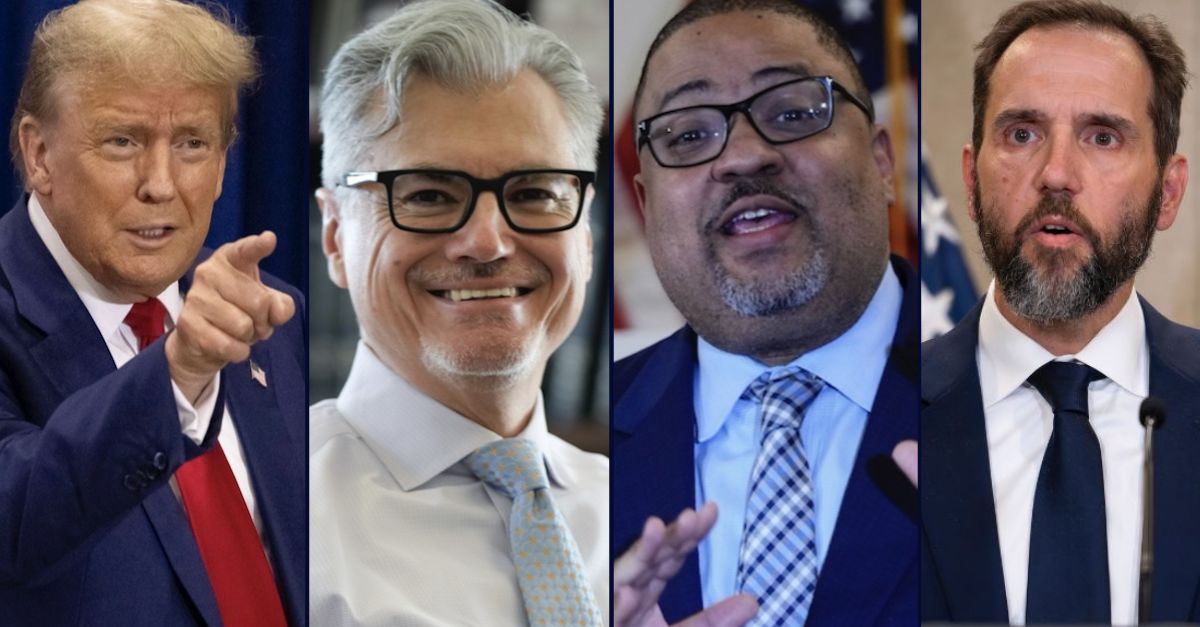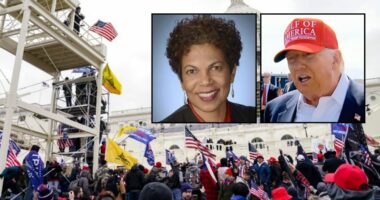
Left to right: Republican presidential candidate former President Donald Trump speaks Tuesday April 2, 2024, at a rally in Green Bay, Wis. (AP Photo/Mike Roemer), Judge Juan Merchan poses for a picture in his chambers in New York, Thursday, March 14, 2024 (AP Photo/Seth Wenig), FILE — Manhattan District Attorney Alvin Bragg gestures while speaking during a news conference Feb. 22, 2024, in New York (AP Photo/Frank Franklin II), Special counsel Jack Smith speaks to the media about an indictment of former President Donald Trump in August 2023 (AP Photo/J. Scott Applewhite, File).
The judge overseeing the time-capsuled hush-money case against President-elect Donald Trump on Friday gave prosecutors all they wanted while the defense got only some of what they were asking for.
The penultimate hand came down favorably for Manhattan District Attorney Alvin Bragg. And, holding one pocket ace in the soon-to-be-shelved case, is a noted non-player: special counsel Jack Smith.
Now, two hitherto-separate prosecutions could intermix in legally relevant ways for the New York City-based case against Trump.
As Law&Crime previously reported, Smith, bound by DOJ rules, is calling it quits in the Jan. 6 case based out of Washington, D.C.
Days after Trump won the presidential election, the special counsel gave himself a self-imposed deadline of Dec. 2 for a final status — which was quickly formalized by U.S. District Judge Tanya Chutkan.
“By December 2, 2024, the Government will file a status report or otherwise inform the Court of the result of its deliberations,” the motion to vacate reads. “The Government has consulted with defense counsel, who do not object to this request.”
The precise procedural posture Smith will take on Dec. 2, is of course, not yet a matter of public knowledge. The practical effect, however, is a foregone conclusion: the federal case is ending.
For all intents and purposes, or at least the foreseeable future, so is the business records falsification case against the 45th and 47th president — something both the state and Trump agreed on.
More Law&Crime coverage: ‘Paper shredding truck’ outside DOJ means court must order Jack Smith to preserve records from ‘abomination’ of investigation into Trump, Ken Paxton says
As Law&Crime reported earlier this week, Trump’s attorneys in the Big Apple are eagerly awaiting how Smith will justify shuttering the case he spent years and millions of dollars prosecuting.
In a letter motion, attorneys Todd Blanche and Emil Bove said they wanted to study “the positions taken by DOJ in the federal cases” that are likely to be dismissed or otherwise dissolved.
To that end, Trump’s team asked for a deadline of Dec. 20, to file their new motion to dismiss in the hush-money case.
In other words, Blanche and Bove appeared intent on citing Smith’s own justifications when they filed their final dismissal motion. And they wanted a few weeks to weigh their options and arguments.
New York Supreme Court Justice Juan Merchan, in an order granting relief and setting deadlines, eschewed that defense request. Instead, the court gave Trump until Dec. 2, to file the motion to dismiss.
“Defendant’s motion is due by the close of business Monday, December 2, 2024,” Merchan’s terse Friday order reads. “The People’s response is due by the close of business Monday, December 9, 2024. The Court will not accept reply briefs.”
That date, of course, is the exact date Smith’s status report on the Jan. 6 case is due in the federal district. This timeline will likely provide Trump’s New York attorneys with significantly less than 24 hours to pore over Smith’s arguments and include them in their final “interests of justice” motion to dismiss the hush-money case.
Perhaps coincidentally, the timeline is precisely in line with Bragg’s temporal request in the matter — by way of a motion filed hours before. The district attorney’s office expressed no opinion on when Trump should have to file his final motion. But the prosecution did ask Merchan to set a Dec. 9 deadline for the government to respond.
Aside from tight scheduling conflicts, the Manhattan judge also granted various forms of relief requested by both parties.
In the end, Bragg and Trump agreed the court should stay all the remaining deadlines in the case, hold off on ruling on a previous motion to dismiss, and indefinitely pause sentencing.
The judge was more than happy to oblige.
Now, only two more motions remain in the case — until sometime in 2029 at the earliest. Bragg’s motion is, perforce, contingent on the arguments made in Trump’s; while the defense suggested their motion would be contingent on how Smith fords the river.
The upshot: two before-unrelated prosecutors could make life significantly easier, or slightly more difficult, for the next president’s attorneys as all the lawyers involved go their separate ways.
Have a tip we should know? [email protected]







